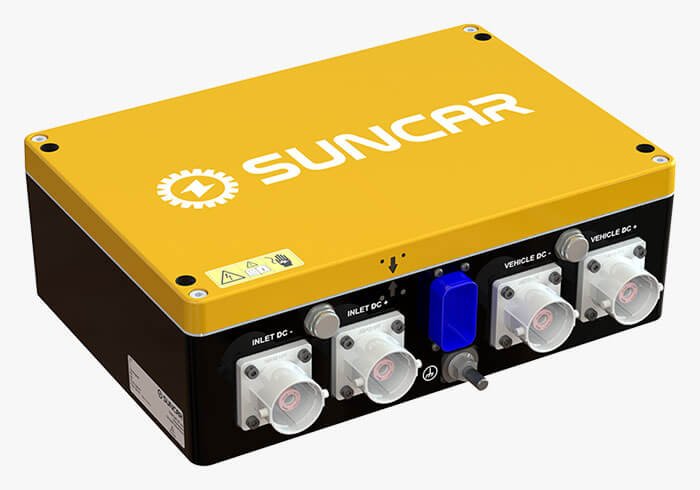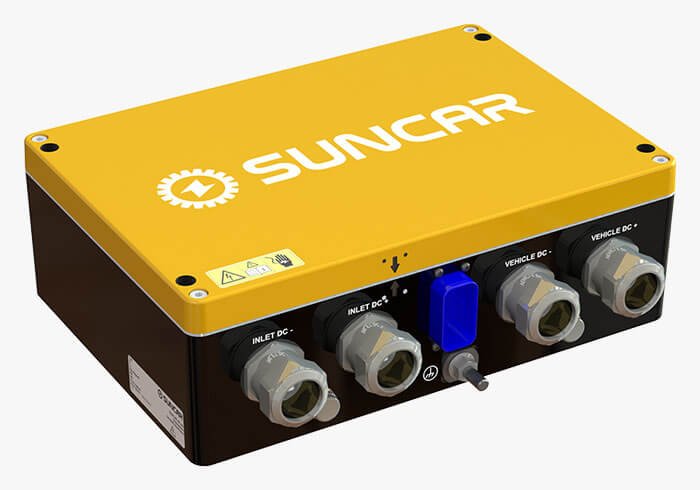INTERFLOW DC Fast Charging Interface
With the INTERFLOW a DC fast charging interface can be integrated into a vehicle or machine with little effort. The communication unit, current measurement and relays enable charging of high-voltage batteries according to the CCS standard.
INTERFLOW500C: DC Fast Charging Interface with HV connector

Features:
- HV connector
- HV switches
- Mainboard (interlock switch, temperature sensor)
- Potential equalization
- Pressure compensation element
- Galvanically isolated HV current and voltage measurements
Option Charge Control Unit:
- CCS 2.0 communication according to DIN70121 / ISO15118
- GB/T communication AC and DC charging according to 27930*
- CAN communication with vehicle control unit
- Functional safety up to ISO26262 ASIL B
- Inlet according to IEC 62196-3
- Derating based on temperature sensors on the inlet (AC/DC)
- Control of connector interlock and LEDs
* under development
Spezifikationen:
Connection type
HV connector
System voltage
800 / 1000 VDC*
Current
350 / 500 A*
Supply voltage
12 / 24 V
System weight
9 kg
Ambient temperature
-40 – +85 °C
Protection class
IP67 und IK09
Dimensions (L x W x H)
330 x 230 x 111 mm
* 2 versions available
INTERFLOW500G: DC Fast Charging Interface with Cable Glands

Features:
- EMC cable glands
- HV switches
- Mainboard (interlock switch, temperature sensor)
- Potential equalization
- Pressure compensation element
- Galvanically isolated HV current and voltage measurements
Option charge control unit:
- CCS 2.0 communication according to DIN70121 / ISO15118
- GB/T communication AC and DC charging according to 27930*
- CAN communication with vehicle control unit
- Functional safety up to ISO26262 ASIL B
- Inlet according to IEC 62196-3
- Derating based on temperature sensors on the inlet (AC/DC)
- Control of connector interlock and LEDs
* under development
Spezifikationen:
Connection type
EMC Cable Glands
System voltage
800 / 1000 VDC*
Current
350 / 500 A*
Supply voltage
12 / 24 V
System weight
9 kg
Ambient temperature
-40 – +85 °C
Protection class
IP67 und IK09
Dimensions (L x W x H)
330 x 230 x 111 mm
* 2 versions available
Are you interested in one of our products or do you need a customization?
Please fill out the form without obligation below and we will contact you immediately.
We use your information to respond to your request. For more information, please see our Privacy Policy .
The INTERFLOW DC Fast Charging Interface
DC charging made easy
For optimal flexibility in charging a battery electric heavy-duty vehicle, such as a construction machine or off-highway vehicle, quick charging is essential to minimize downtime. The INTERFLOW DC Fast Charge Interface, or DC Fast Charge Junction Box, seamlessly integrates level 3 charging. It serves as the ideal solution, facilitating rapid charging through the CCS 2.0 interface. This interface manages communication between chargers, monitors the charging process, and ensures safety. In comparison to AC charging, DC charging with an external charger delivers significantly higher performance, resulting in shorter charging times. The INTERFLOW DC fast charging interface is designed to withstand the rigors of the working day and features a rugged aluminum housing, sturdy full metal cable glands and high quality internal components. Each product is carefully manufactured in-house at SUNCAR and undergoes a thorough testing process to ensure reliable and safe operation. The optional Charge Control L controller of the INTERFLOW500 allows charging according to the latest industry standards, enables customer-specific configurations and communicates with both the charging station and the vehicle controller via CAN bus.
Configurations
The INTERFLOW DC fast charging interface is available in two power levels for different vehicle or machine sizes, each with voltage up to 800 V. If an additional high voltage distribution unit such as the FUSION is required, the INTERFUSION800M can be used for this purpose as a combined fast charging and distribution module.
Safety
The charging process is continuously monitored by means of precise, galvanically isolated current and voltage meters as well as temperature sensors on the connector and in the housing, which throttle the charging power if the temperature limit is exceeded. Furthermore, the INTERFLOW is integrated into the machine-wide interlock system with the interlock switch. When a component of the high-voltage system is opened, the interlock system trips and activates the battery contactors, which disconnect the machine from the power source. The enclosure can be grounded at the grounding stud and is also connected to the conductive cable sheathing of the input and output cables by means of the EMC cable glands to intercept and ground electromagnetic interference.
